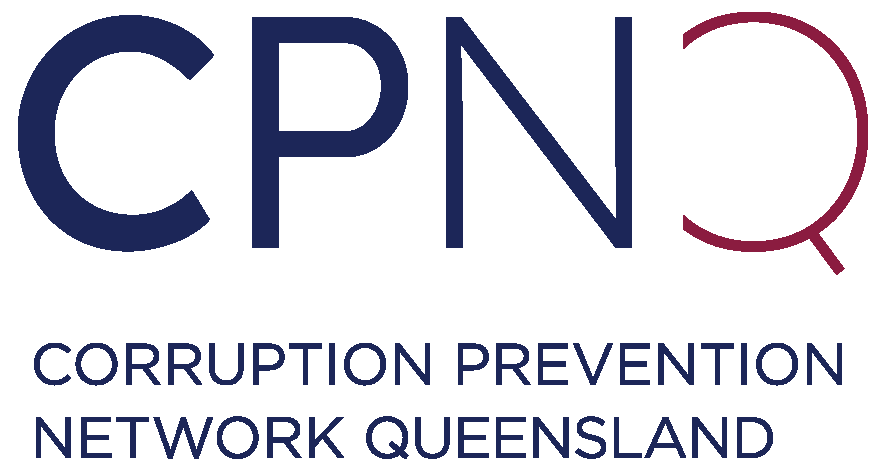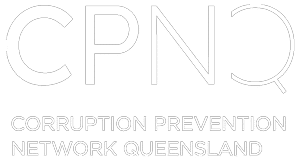Code Of Conduct
Purpose
All members of CPNQ value and are committed to upholding and demonstrating the highest ethical standards. As a network of professional anti-corruption practitioners and people with interest in corruption prevention, such commitment is essential to achieving our purpose in enhancing corruption prevention in Queensland and ensuring our reputation as a valued part of the integrity framework in this State.
This Code of Conduct (the code) assists members, prospective members and interested parties by outlining the ethical principles and obligations expected of CPNQ members and guides members in their dealings, interactions and activities, as representatives and participants of the CPNQ.
Application
The CPNQ is non-profit independent organisation whose membership is open to individuals and organisations from both the private and public sector. This Code of Conduct applies to all members of the CPNQ. Copies of this Code will be made available to any person upon request, and can be downloaded from this page of the CPNQ website.
Public sector employees who are members of the CPNQ must recognise that their employing entities’ code of conduct has primary authority on their behaviour, even though they are asked to engage and respect this CPNQ Code of Conduct. If the requirements of this Code conflict with any other professional obligations applying to a member, the member shall observe their professional obligation and disclose the conflict with the CPNQ Management Committee.
Objectives of the Association
To facilitate communication between members of the CPNQ, to promote the development and implementation of strategies to prevent corruption and fraud, and improve ethical conduct in the workplace in both the private and public sector.
To develop opportunities for CPNQ members to share knowledge, experiences and resources to:
- effectively implement best practice in corruption prevention
- reduce the duplication of effort to achieve effective strategies
- reduce the incidence of inappropriate and corrupt behaviour
- reduce the costs associated with managing corrupt conduct in the workplace
- minimise distress to individuals and organisations arising from workplace corruption.
To promote, develop and strengthen communication between CPNQ members and other organisation with related objectives.
To foster an independent and self sufficient Corruption Prevention Network Queensland.
Ethical Principles
The First Principle – Integrity and impartiality
- Act honestly and be trustworthy, thus enhancing the reputation of CPNQ.
- Support CPNQ objectives and adopt a collaborative, practitioner-based, holistic, people-centred, co-operative, sustained, and supportive approach to CPNQ activities.
- Ensure individual conduct is consistent with maintaining and enhancing confidence in the CPNQ.
- Not engage in behaviour that is improper, disgraceful or unbecoming.
- Disclose in writing any potential, apparent or actual conflict of interest to the CPNQ.
- Raise any conflicts of interest between acting on behalf of CPNQ and acting in any other capacity.
- Not solicit gifts or bribes, and take the lead in advocating and endorsing ethical action.
- Act with impartiality and independence, “without fear or favour”, free from discrimination.
The Second Principle – Promoting the public good
- Only claim or accept out-of-pocket or other expenses (including travelling allowance) arising out of matters that are directly attributable to CPNQ business.
- Not misuse the electronic communication systems of the CPNQ to access, create, store, copy, retrieve or distribute inappropriate material.
- Ensure activities are transparent and communicated to all interested parties.
- Ensure that resources are safeguarded and not wasted, abused or used improperly or extravagantly.
- Exercise care and attention when carrying out any CPNQ duties.
The Third Principle – Commitment to the system of government
- Discharge responsibilities in accordance with legal and financial requirements.
- Comply with the Rules of Association of the CPNQ.
- Report fraud, misconduct, corruption and maladministration of which one becomes aware.
The Fourth Principle – Accountability and transparency
- Encourage development and maintenance of a culture of openness and trust amongst members.
- Consult with members on decisions affecting them and act collegially.
- Respect the views of all members, and not seek to impose preferred solutions.
- Respond to legitimate rights and needs of members with courtesy and sensitivity, in a timely manner.
- Act with proper regard for member’s rights, obligations, cultural differences, safety, health and welfare, without discrimination or harassment, with sensitivity to religious, social and political affiliations.
- Act with self-control, tolerance and understanding.
- Cooperate with and assist officeholders in the performance of duties when reasonably necessary.
- Respect confidentiality where appropriate.
- Not use information acquired in the pursuit of CPNQ activities for personal gain.
- Carry out the obligations of ones position in the CPNQ independently, impartially and fairly.
- Act responsibly in the performance of one’s functions
Special Note
Many Members of the Network have by virtue of their public agency employment, access to the use of public sector resources and public sector information. Members of the network have a duty of fidelity and good faith to use those resources within the spirit of their intended use, specifically:
Intellectual Property – Any documents produced by the Crown in the State of Queensland, are the property of the Crown, and are not to be used for the purposes of commercial gain. All copyright remains with the State of Queensland. The same applies to private sector intellectual property.
Public Sector Resources – Those provided to the Network are to be used for the purpose for which they were provided. Allegations of misuse of public sector resources supplied to the network will be referred by the Management Committee to an appropriate body, which may include the Crime and Corruption Commission (CMC) for appropriate action.
Back to top
Breaches of the Code of Conduct
All breaches must be reported to the Management Committee, who shall deal with the breaches fairly, consistently, appropriately and in a timely manner.
The Rules of Association of the Corruption Prevention Network Queensland section 9 deals with the termination of a membership under certain situations, and section 10 with the appeal against the termination of membership. Copies of the rules of the association of the CPNQ can be obtained from the website at www.cpnq.org.

Taking Corruption Seriously
Are you interested in corruption and fraud prevention and/or improving ethical conduct within your organisation?

